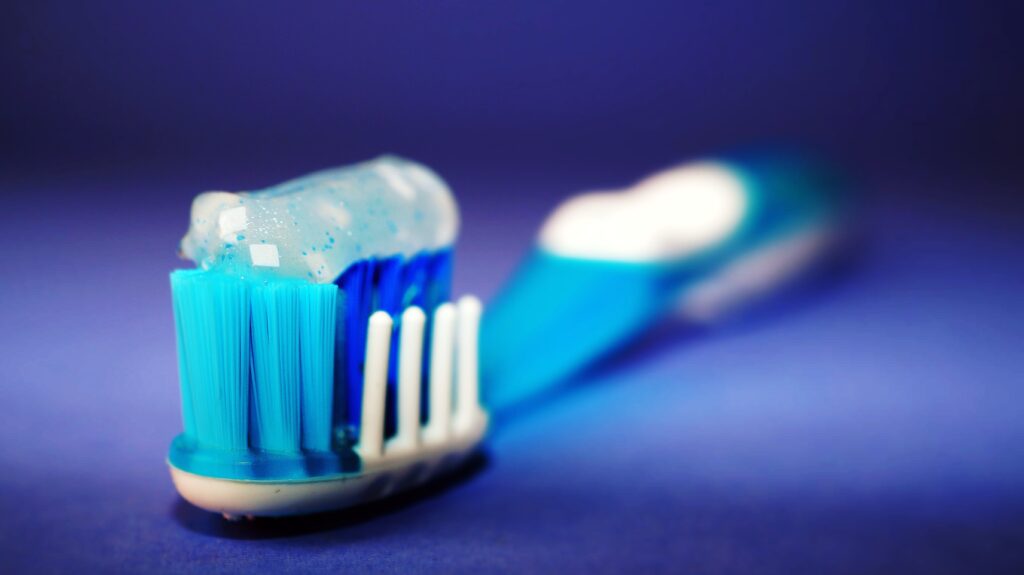It’s only natural to want a safe home hygiene routine. After all, a desire to improve and maintain your health is the entire purpose of self-care. And with so many confusingly-named chemicals and other substances in our products, it’s easy to get concerned about potential risks.
Fluoride is a common substance people worry about. We come into daily contact with fluoride, whether it’s in our drinking water, our food, or our toothpaste, so it’s important to learn about it. Let’s explore what fluoride is and if it poses any potential health risks. This way, you can make an informed decision about what to use to protect your teeth.
What is fluoride?
Fluoride is a naturally occurring mineral composed of the element fluorine mixed with one or two other elements. Fluoride is found in trace amounts all over the world in water, rocks, air, soil, and plants. It’s even found naturally in foods like spinach, grapes, and potatoes.
In the 1970s, the world was also introduced to fluoridated toothpaste, and it has widely been accepted to be a major contributor to the fall of tooth decay rates worldwide. It’s still a common component of most store brand toothpastes to this day.
What are the benefits of fluoride?
Fluoride benefits your teeth in four major ways:
- Preventing harmful oral bacteria growth
- Remineralizing tooth enamel
- Slowing down tooth mineral loss
- Reversing early stages of tooth decay
Bacteria in your mouth break down carbohydrates and sugars in your food while you eat. As part of the process, they produce acidic compounds that eat away at the enamel of your teeth. This process is called demineralization. It can not only weaken your teeth, but also leave them more vulnerable to cavity-causing bacteria.
Fluoride literally rebuilds, or remineralizes, the enamel in your teeth. It’s an incredible process that can address and reverse a potential problem. But if fluoride is so beneficial, why are people so worried about it?
Is fluoride toothpaste safe?
In small amounts, fluoride is absolutely safe. It can, however, cause problems in excess. One frequent concern is the risk of dental fluorosis. This condition causes a change in the color of tooth enamel, usually white or brown spots.
Fluorosis is most common in children during their tooth-growing years, but it is preventable. It’s important to note that fluoride is only beneficial when it comes into contact with your teeth, not when it’s ingested. Children are at a particularly high risk when they swallow their toothpaste, so this problem can often be prevented by supervising and making sure kids know to spit out their toothpaste. They should also only use a pea-sized amount, as any more increases risk without increasing benefits.
High levels of fluoride also put people at risk of developing skeletal fluorosis, which is a buildup of fluoride in bones. It causes stiffness and pain. However, fluorosis is most commonly a problem in areas where drinking water has higher fluoride levels than is recommended by the CDC.
The International Association of Oral Medicine and Toxicology also notes a few other potential health risks of excessive fluoride consumption, including diabetes, cardiovascular problems, and cognitive deficits. However, there is insufficient evidence of these problems being a direct result of fluoride toothpaste, especially when used in recommended amounts.
Ultimately, there is still a large debate about fluoride in water and food products, but most experts, including the CDC, agree that it is safe in toothpaste, especially when spitting it out as directed. However, we understand that some people might want to avoid the risk entirely. Luckily, there is a highly effective substitute.
A fluoride alternative
If you want to avoid fluoride, your best bet is likely hydroxyapatite toothpaste. Hydroxyapatite is the primary component of enamel, making up 60-70% of its inorganic compounds. It features many of the same benefits of fluoride, including remineralization. Some studies have found it to be effective in tooth remineralization. It should be noted, however, that fewer studies have been done on the safety of hydroxyapatite than fluoride. This is a new area of study for dentistry. However, it is harder to find and typically more expensive than fluoride toothpaste. Some popular brands include Boka Ela, Karex, Risewell, and LivFresh.
Come visit us at Cobblestone Family Dentistry
Doing research into home care products is a fantastic way to optimize your dental health, but it’s only one part of the equation. It’s important to visit your dentist regularly for checkups, cleanings, and any procedure that may need to be done. Together, we can keep your teeth strong and healthy for years to come.
To schedule an appointment at Cobblestone Family Dentistry, please call (405) 603-8520 or email us today.


